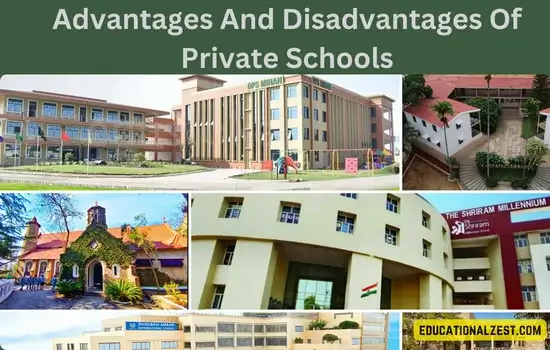In the last 20 years, the number of private schools all over the world has increased to a great level. Offering premium learning experienced, these schools made sure that the students who study there get a better academic and career opportunity. It is true that these schools excel a great deal when it comes to the proper learning atmosphere and great teaching staff, but there are some problems in their system also. In case of their influence in the education industry as a whole, there are some relevant questions also. Here we will discuss about all of these matters and offer a clear picture of the advantages and disadvantages.

Advantages of Private Schools:
Quality Education:
Private schools show the better performance academically with fewer students, qualified teachers, more advanced instructional resources. Private schools are composed of smaller classes that teaching can be personalized and it makes teacher-student relationships possible. Personalized education has made possible for the teachers to tailor classes according to the learning style and need of the students leading them towards the academic achievements. Private schools shall staff personnel possessing subject knowledge, expertise degrees, specialist training. Privatization and independence from governmental rules and inspection could change the quality and practices of education.
State-of-the-Art Facilities:
Private schools provide cutting-edge academic, extracurricular, and personal development facilities. Private schools upgrade classrooms, laboratories, and sports facilities to boost learning. Private schools prioritize well-equipped, learning-friendly classrooms. Private schools boost teaching and student involvement with modern furniture, interactive whiteboards, audio-visual technology, and other instructional aids. These products help teachers create dynamic, engaging lessons for diverse learners.
Extracurricular Opportunities:
Private schools have various extracurricular activities, clubs, and sports teams that improve academics and growth. These programs assist kids develop leadership skills, discover their passions, and make meaningful relationships outside of class, enhancing character. Private schools provide extracurricular activities to help pupils develop passions and skills. Debate teams, plays, and community service are options for private school students. In a nurturing environment, these activities help kids explore new interests, develop skills, and lead.
Parental Involvement:
Parents’ tight ties with private schools promote parental involvement. Parent-teacher collaboration is essential for kids’ academic success and well-being. Private school parental involvement improves academic success. Research shows that teens with active parents are more motivated, persistent, and academically successful. Parents may support and steer their children’s learning, improving schooling and performance. Beyond academics, parents participate in school activities, extracurriculars, and fundraising.
Higher Academic Standards:
Private schools stress academic accomplishment and high standards, which may motivate students. Private schools may have higher academic standards than public schools, motivating students to excel. High academic standards at private schools motivate students to study and set ambitious goals. Setting academic standards and encouraging pupils to succeed creates a culture of accomplishment in private schools. Academic rigor prepares private school students for college and career challenges.
Flexibility in Curriculum:
Private schools’ flexible curriculum and teaching methods let instructors fulfill students’ needs. Private schools may tailor their curriculum to pupils’ interests, unlike public schools, which must follow state or district guidelines. Due to their agility, private schools may adapt student learning using sophisticated teaching approaches. Private school instructors may engage students and fit their learning styles, interests, and skills using a variety of methods, technology, and resources.
Disadvantages of Private Schools:
Cost:
Private schools’ expensive tuition or fees may burden households. Private schools may be too pricey for many families. Private schools charge far more than public schools for specialized programs, smaller classes, state-of-the-art facilities, and other privileges. Family payments for textbooks, clothes, transportation, extracurricular, and other school-related charges may raise private education prices. Not all families can afford private school tuition, thus some must sacrifice or adjust their lifestyle.
Exclusivity:
Private schools often accept students based on academic achievement, standardized tests, or family relationships. This exclusivity may keep diverse and special-needs students out of private institutions. Private schools utilize selective admissions to ensure incoming students meet academic standards and embrace its purpose, values, and educational philosophy. Admissions committees may examine academic performance, extracurricular involvement, and letters of reference, personal statements, interviews, and standardized test scores.
Limited Diversity:
Private schools may lack socioeconomic, racial, ethnic, and cultural diversity, affecting students’ social and emotional development. Private school students are homogenous, which may limit their exposure to other views, experiences, and backgrounds and their ability to develop empathy, cultural competence, and a global perspective. Selective admissions, location, and enrollment history may limit diversity in private schools.
Less Accessible Resources:
Private schools have better resources and facilities, but not all students can attend. Poor and disenfranchised kids may have less resources and opportunities at private schools, increasing education inequity. High tuition and fees make private schools expensive for many families, particularly low-income ones. Social and cultural barriers may prevent marginalized children from attending private schools.
Limited Accountability:
While private schools often have greater flexibility in determining curriculum, hiring, and educational practices, public schools are usually more regulated by state and local entities. Because of this lesser degree of accountability, at times private schools can be more lax in regard to educational requirements. However, few not all private schools will be ones that meet high academic standards, give extensive help, and operate with best practices in teaching and learning. Also, the academic policies enshrined within private schools are opaque without standardized examination regulation, performance indicators nor external assessments.
Conclusion
If you take a look at the aforementioned points, then you will realize that there are ways to see the both ends of the stick. Therefore, the most important part is to make a pledge to balance the system regarding the private school education. For the wellbeing of the student this is an important step. The private schools are increasing fast and they are at every nook and corners. If modified in the right way so far the costs and policies are concerned, these schools can operate perfectly.
